
** The application cycle for this program has ended.**
In spring of 2021, the Computing Research Association (CRA) and the Computing Community Consortium (CCC), with strong support form the National Science Foundation (NSF), announced a new Computing Innovation Fellows (CIFellows) cohort for 2021. As before, this program aids recent and soon-to-be PhD computing graduates whose job search was hampered by the continued disruption COVID-19 has had on academic job hiring practices and the economy.
Modeled after CRA/CCC’s NSF-funded Computing Innovation Fellows Programs with cohorts starting 2009, 2010, and 2011 and CRA’s Best Practices Memo on Computer Science Postdocs and the Computing Innovation Fellows 2020 Project this program offers two-year postdoctoral opportunities in computing, with cohort activities to support career development and community building.
We received 238 applications covering a wide variety of research areas and over 108 universities. Over 100 members of the computing community came out to support the program as reviewers. The 2021 class of CIFellows is comprised of 69 diverse researchers covering a broad range of areas in computing. The cohort is 52% women, come from 49 universities, and will be beginning their CIFellowships at 48 different universities. You can find out more about each CIFellow here.
Webinar
On April 15th, 2021, CRA and CCC held an informational webinar on the CIFellows program. A video recording of the webinar can be found below and the slides can be found here.
Eligibility
The Computing Innovation Fellows Program is open to researchers whose work falls under the umbrella of the National Science Foundation (NSF) Computing and Information Science and Engineering (CISE) Directorate. This includes PhD graduates who are planning a career in academia either as a research scientist or in a faculty position. Mentors must be at a US academic institution. Applicants must meet the following criteria to be eligible to apply:
- Must complete their PhD at a US institution OR be a US citizen/permanent resident. We will not be helping secure any visas for applicants.
- Applicants must complete or plan to complete their PhD between 1/1/20 – 12/31/21
A central goal of the CRA is to foster a diverse computing research field by engaging and retaining individuals from different backgrounds. This often involves people from groups of historically underrepresented individuals in computing including, but not limited to, women, minorities, people with disabilities, veterans, LGBTQ+, low socioeconomic, rural, etc. CRA strongly encourages applications demonstrating such diversity. In addition, we strongly encourage submissions from individuals whose work is intended to broaden participation in computing, including students and faculty at Minority Serving Institutions and in non-PhD granting programs.
Award Details
Awards will be for two years as a postdoctoral researcher. These subawards from the CRA to the Host Institution will cover an annual salary of $75,000, fringe, and indirect (capped at 35%). CIFellowships can begin in September, 2021 or January, 2022.
As a CIFellow, you are employed as a postdoctoral researcher by your Host Institution and paid a salary and benefits from a federal grant (through a sub award to the Institution). Your CIFellowship appointment is considered your full-time employment. If you wish to be paid for additional work outside of your CIFellowship research, you must ensure that it is in accordance with the policies set by your Institution and does not conflict with your CIFellowship research.
Finding a Mentor/CIFellow
We encourage community members to use their networks to find potential matches. To help with this process, we have created an Opportunity Board for the CIFellows 2021 application cycle.
Application Guidelines:
Applicants must submit the following:
- Research Proposal – A 1-page statement of research objectives/goals for the duration of the two year CIFellowship, including Intellectual Merit and Broader Impacts as defined in the NSF PAPPG. Broader Impacts might include addressing the changing world due to COVID-19, broadening participation, and/or pedagogical considerations. References may be included on a second page.
- CIFellowship Plan – A 1-page statement that describes the research skills and experiences the candidate plans to gain during the CIFellowship and how these will advance their career objectives. These might include, e.g., authoring a research proposal; improving technical presentation techniques; conference attendance; managing and motivating a (student) research team; or teaching. This plan should be written in collaboration with the proposed Mentor. It should explain how the CIFellow and Mentor will work together to achieve what is planned, particularly if not co-located.
- Mentoring Plan – A 1-page document, written in conjunction with the CIFellow, that outlines how the Mentor will work with the CIFellow to achieve their goals. We encourage the CIFellow and the Mentor to consider the following strategies, based on best practices, when developing the Mentoring Plan:
- CIFellow and Mentor create a formal Individualized Development Plan (IDP) at the beginning of the CIFellowship period (Fuhrmann et al., 2011).
- CIFellow and Mentor meet regularly (at least quarterly) to discuss progress towards the IDP and make appropriate adjustments.
- CIFellow has the opportunity to supervise or co-supervise other students.
- CIFellow is guided to developing their own research agenda, including proposal writing.
- CIFellow is encouraged to network with new research communities, as defined by CIFellow and Mentor.
- Academic CV, two pages maximum.
- Letter of recommendation from current research supervisor.
- Additional letter of recommendation.
- Letter of support from proposed Mentor – This letter must indicate a lack of funding for support of the applicant and complement the CIFellowship Plan.
- Registration (Must be entered in HotCRP by midnight May 10th AoE)
- Title – title of proposed research project. If you are applying twice with the same project, please use the same title but follow it with A on the first application and B on the second).
- Application information – items will include diversity information; the PhD (university, advisor, date of defense); current professional information (university, current position, advisor); and CIFellowship information (Mentor name and email address, host institution, location where CIFellow will live and work during the CIFellowship, and preferred start date).
- Author information for letters of recommendation – name and email address of current research supervisor; name and email address of the writer for the additional letter of recommendation.
- Topics – Select up to two research areas that relate to your proposal. If your research area is not listed as an option, select ‘other’ and specify the research area in the ‘optional additional information’ section on your application.
Applicants may apply twice, with two different Mentors. Each application should be separate. One award per applicant and one award per Mentor will be awarded.
Evaluation Criteria
- Applicants will be evaluated on their track record of research accomplishment, and on the merits of their Research Proposal.
- Applicants will be evaluated on the merits of their CIFellowship Plan, in conjunction with the Mentor’s letter and the Mentoring Plan.
- Attention will be paid to diversity. CIFellowships will be awarded to span the research areas of CISE (on your application, you will select from these research areas, which CISE programs fall under). Preference will be given to US citizens and permanent residents.
- No more than two CIFellowships will be awarded to candidates whose PhDs were/will be awarded from a single university.
- No more than two CIFellowships will be awarded to candidates whose mentors are at a specific university.
What does AoE mean?
AoE stands for Anywhere on Earth (the submitters local time).
Why is there registration?
We are asking applicants to ‘register’ in order to collect as much information as possible early on and have a better idea of how many applications we have in each area to guide the formation of reviewer groups. Please note you will not be considered ‘registered’ until you submit your application. To do this please select “This submission is ready for review” and then “save and submit”.
What if I decide not to submit or want to change something after registering?
Applicants will have the ability to pull their application or make changes to their application, even after submitting registration, up until the final deadline midnight May 17th AoE . If you change your Mentor after the registration date you must notify someone on the CIFellows 2021 team.
Can I apply with two Mentors for one project?
Yes but we only want one mentor letter and one mentor plan so have them write it together and pick a single host institution.
I’m not in CS, can I still apply?
Yes, you don’t have to be in CS. As long as your research is under the CISE umbrella, including the topics listed under the “Additional Funding Opportunities for the CCF community”.
What does it mean to “complete” the PhD degree?
“Complete” for these purposes means when the applicant has met all of the PhD degree requirements, including submission of the final thesis. It is not necessary to have the diploma in hand.
May non-US citizens apply?
Yes. Preference will be given in the selection process to US citizens and permanent residents, but applicants must complete (or anticipate completing) the PhD degree during the window of 1/1/20 – 12/31/21 and their PhD must be from a US institution. We will not be helping with visas.
How will the recommendation letters be evaluated?
The recommendation letters should explain how and why the applicant deserves to be awarded a CIFellowship. We are particularly interested not only in promising researchers and educators, but also in people who are committed to establishing a career in advanced research and/or higher education.
Why can I apply with two separate mentors? How will this work?
Mentorship is a key part of the CIFellows experience. The Selection Committee realizes that different researchers view mentorship differently and want to provide each applicant with the best possible opportunity to do impactful research and be well mentored during their CIFellowship. Encourage your proposed mentor to look at the FAQs For Mentors. Each CIFellow / Mentor application will be evaluated separately. Please note that you will submit two applications, one for each Mentor. Each application should be a separate submission. At most one applicant-mentor pair will be awarded. If you are applying twice with the same topic, in the Title section of the application please put “<research title> A” on one application and “<research title> B” on the other, to distinguish them.
Presumably your letters of recommendation from current research supervisor and an additional person will be the same. Please let them know that they will be asked to submit the letter twice.
Is it OK if my Mentor is not from a CS department?
Yes, that is OK. It is not necessary for a Mentor to be in a CS department. However, applications will be assessed in part on how well they might advance, broadly, fields under the CISE umbrella.
Does my research have to be the same area as my PhD research?
No, postdocs are intended to be career broadening. Preference will not be given to certain applications based on how different or similar their research proposal for the CIFellowship is to their past research.
I would like to apply to work with a Mentor at my current PhD institution. Is that OK?
Yes, that is OK. Realize however, that a CIFellowship is intended to be a career growth opportunity, not a time to continue doing what you are already doing. If you choose to stay at your current institution, think about the potential mentorship arrangements that could enhance your career growth during your CIFellowship.
Why is there a selection restriction of at most two CIFellows from or mentored by a single university (Max 2 rule)?
A goal of the CIFellowship program is to maximize the number of institutions that participate, either by producing CIFellows or hosting them. As such, the Selection Committee will work to ensure that no more than two CIFellowships are awarded to any institution and that no more than two CIFellows come from any institution. Further, no Mentor will be selected for multiple CIFellows.
Are there any limits on how many proposals come from candidates associated with a single university?
No.
What is expected in the Optional Additional Information section of the application?
Nothing is expected here, but this is where you can share information that is relevant to your application, such as, circumstances of your job search or necessary arrangements due to the pandemic.
Can my proposed Mentor be my PhD or current research advisor?
No, as the CIFellowship is to be a career growth experience, your mentor cannot be someone whom you’ve worked this closely with previously.
Will progress be monitored throughout the CIFellowship?
Yes, CIFellows will be required to submit quarterly reports on their progress.
Are there efforts towards matching mentors with applicants?
Yes, we have created an Opportunity Board for prospective Mentors and CIFellows to find opportunities. This Opportunity Board is provided for you to use, and while it will be monitored by CRA and CCC, we will not be endorsing any posts or making any recommendations. Posts on the Opportunity Board will not be considered during the evaluation of applications.
Should I mention in my first proposal that I have a preference on this application over the second proposal?
Applicants may apply twice, with two different mentors. Each application should be a separate submission. At most one applicant-mentor pair will be awarded. Please indicate which proposal you prefer in the Optional Additional Information section on the application.
How does inviting letter writers into the application system work?
For the registration (items to be submitted by May 10th), we will ask for the name and email addresses of all letter writers including mentor, PhD advisor and additional letter of recommendation writer. After registration, the letter writers will be invited into HotCRP as an external reviewer. You should tell them to look for an email from “noreply@cif2021.hotcrp.com“. They will submit their letter using that link. If you are submitting two applications, please make sure your letter writers are aware they will have to submit their letter twice on behalf of each application.
What is the distinction between the CIFellowship and Mentorship plan?
The CIFellowship plan is intended to be written by the applicant and explain what they want to get out of the CIFellowship and how they will achieve those goals. The Mentorship plan is intended to be written by the applicant and the mentor. It will probably have some overlap, but it should focus on how the mentor and the applicant will work together to achieve the applicant’s goals.
What should be included in the Mentor Letter?
As proper mentoring is unique for CIFellows, the Mentor Letter will be a key component of the application. It is critical that the CIFellowship be a time for the postdoc researcher to gain independence and to have opportunities to lead in their research endeavors. As such, the Mentor Letter should reference the Fellowship Plan, which should be written collaboratively with the applicant.
What if the CIFellow and I are not co-located?
There are many situations where remote work is possible, especially in the current times. CRA will manage additional funds that can be applied for use so that the CIFellow can travel to the Mentor’s location, if needed.
Are there any limits on the number of candidates that a single mentor signs up to work with?
There are no limits on the application side, but realize that a Mentor can only be part of one award.
Are there any limits on the number of faculty at one university that can be proposed as mentors in the CIFellows program submissions?
No.
How do I apply to be a Mentor?
We have created an Opportunity Board for prospective Mentors and CIFellows to find opportunities. This Opportunity Board is provided for you to use, and while it will be monitored by CRA and CCC, we will not be endorsing any posts or making any recommendations. Posts on the Opportunity Board will not be considered during the evaluation of applications.
Mentors must be at a U.S. academic institution.
If I’m a mentor of a CIFellow from 2020, can I also mentor a CIFellow in the 2021 cohort?
No, as this is a community building program, a mentor can only be matched with one CIFellow at a time.
Leadership Team
Andrew Bernat
 Andrew Bernat was a founding member and chair of the Computer Science Department at the University of Texas at El Paso (spending 20 years there), NSF Program Director and is currently the Executive Director of the Computing Research Association, whose mission is to strengthen research and education in the computing fields, expand opportunities for women and minorities, and improve public and policymaker understanding of the importance of computing and computing research in our society. In recognition of “… his success in creating arguably the strongest computer science department at a minority-serving institution …”, the Computing Research Association honored him with the 1997 A. Nico Habermann Award and he is a AAAS Fellow. He has some 65 publications and (pre-CRA) over $5,000,000 in external funding.
Andrew Bernat was a founding member and chair of the Computer Science Department at the University of Texas at El Paso (spending 20 years there), NSF Program Director and is currently the Executive Director of the Computing Research Association, whose mission is to strengthen research and education in the computing fields, expand opportunities for women and minorities, and improve public and policymaker understanding of the importance of computing and computing research in our society. In recognition of “… his success in creating arguably the strongest computer science department at a minority-serving institution …”, the Computing Research Association honored him with the 1997 A. Nico Habermann Award and he is a AAAS Fellow. He has some 65 publications and (pre-CRA) over $5,000,000 in external funding.
Elizabeth Bradley
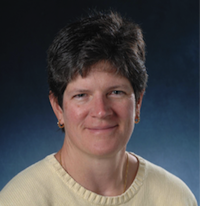 Liz Bradley holds the SB, SM, and PhD degrees from MIT. She has been with the Department of Computer Science at the University of Colorado since 1993 and is currently the Chair of the Computing Research Association’s Computing Community Consortium (CCC). Her research interests include nonlinear dynamics and nonlinear time-series analysis. She is a member of the external faculty of the Santa Fe Institute and the recipient of a National Young Investigator award, Packard and Radcliffe Fellowships, and the University of Colorado system’s highest teaching award.
Liz Bradley holds the SB, SM, and PhD degrees from MIT. She has been with the Department of Computer Science at the University of Colorado since 1993 and is currently the Chair of the Computing Research Association’s Computing Community Consortium (CCC). Her research interests include nonlinear dynamics and nonlinear time-series analysis. She is a member of the external faculty of the Santa Fe Institute and the recipient of a National Young Investigator award, Packard and Radcliffe Fellowships, and the University of Colorado system’s highest teaching award.
Randal Bryant
 Randal E. Bryant is the Founders University Professor of Computer Science Emeritus at Carnegie Mellon University. He served on the faculty at Carnegie Mellon from 1984 to 2020, starting as an Assistant Professor and progressing to the rank of University Professor of Computer Science. He also held a courtesy appointment in the Electrical and Computer Engineering Department. He served as Dean of the School of Computer Science from 2004 to 2014. Upon his retirement in 2020, he was awarded the SCS Founders Chair, and he remains active in university and professional service, as well as research and writing.
Randal E. Bryant is the Founders University Professor of Computer Science Emeritus at Carnegie Mellon University. He served on the faculty at Carnegie Mellon from 1984 to 2020, starting as an Assistant Professor and progressing to the rank of University Professor of Computer Science. He also held a courtesy appointment in the Electrical and Computer Engineering Department. He served as Dean of the School of Computer Science from 2004 to 2014. Upon his retirement in 2020, he was awarded the SCS Founders Chair, and he remains active in university and professional service, as well as research and writing.
Ken Calvert
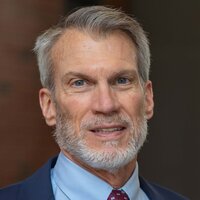 Ken Calvert is Gartner Group Professor in Network Engineering at the University of Kentucky, where his research deals with the design and implementation of advanced network protocols and services. From May 2016 through December 2019 he served on assignment at the National Science Foundation as Division Director for Computer and Network Systems in the Computer and Information Science and Engineering (CISE) Directorate at the National Science Foundation. Previously he was a faculty member at Georgia Tech and a Member of Technical Staff at Bell Telephone Laboratories in Holmdel, NJ. He is a member of the ACM and a Fellow of the IEEE.
Ken Calvert is Gartner Group Professor in Network Engineering at the University of Kentucky, where his research deals with the design and implementation of advanced network protocols and services. From May 2016 through December 2019 he served on assignment at the National Science Foundation as Division Director for Computer and Network Systems in the Computer and Information Science and Engineering (CISE) Directorate at the National Science Foundation. Previously he was a faculty member at Georgia Tech and a Member of Technical Staff at Bell Telephone Laboratories in Holmdel, NJ. He is a member of the ACM and a Fellow of the IEEE.
Ann Schwartz Drobnis
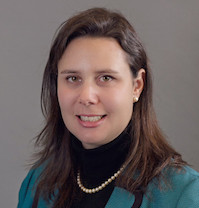 Dr. Ann Schwartz Drobnis is the Director of the Computing Community Consortium. Most recently, she was an Albert Einstein Distinguished Educator Fellow at the National Science Foundation working on education and workforce development issues for the CISE Directorate. Ann spent most of her time working on the CS10K Project, whose goal is to get academically rigorous computer science courses into 10,000 high schools by 2016. This is a much needed effort to create the research and workforce pipeline that our field so desperately needs. Prior to her time at NSF, she taught high school computer science and math at Thomas Jefferson High School for Science and Technology. She has a passion for broadening participation in computing, as her doctoral research was focused on ways to bring more females into the field.
Dr. Ann Schwartz Drobnis is the Director of the Computing Community Consortium. Most recently, she was an Albert Einstein Distinguished Educator Fellow at the National Science Foundation working on education and workforce development issues for the CISE Directorate. Ann spent most of her time working on the CS10K Project, whose goal is to get academically rigorous computer science courses into 10,000 high schools by 2016. This is a much needed effort to create the research and workforce pipeline that our field so desperately needs. Prior to her time at NSF, she taught high school computer science and math at Thomas Jefferson High School for Science and Technology. She has a passion for broadening participation in computing, as her doctoral research was focused on ways to bring more females into the field.
Ellen Zegura
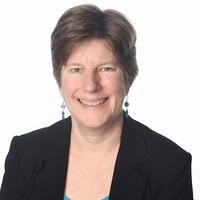 Ellen Zegura is Regents’ Professor and Fleming Endowed Chair holder in the School of Computer Science at Georgia Tech. She works in two primary areas, computer networking and computing for social good. In computer networking, she is known for her work on the GT-ITM suite of Internet topology tools, which remain in use 20 years after release. In mobile wireless networking, she and colleagues invented the concept of message ferries to facilitate communications in environments where network connectivity is unreliable and/or sparse. Her work in computing and social good includes work in Liberia, with Native Americans in Southern California, and with residents of the Westside of Atlanta. She is a Fellow of the IEEE, a Fellow of the ACM, and an elected member of the Computing Research Association Board (CRA). Since Fall 2014 she has been on the Executive Board of the CRA.
Ellen Zegura is Regents’ Professor and Fleming Endowed Chair holder in the School of Computer Science at Georgia Tech. She works in two primary areas, computer networking and computing for social good. In computer networking, she is known for her work on the GT-ITM suite of Internet topology tools, which remain in use 20 years after release. In mobile wireless networking, she and colleagues invented the concept of message ferries to facilitate communications in environments where network connectivity is unreliable and/or sparse. Her work in computing and social good includes work in Liberia, with Native Americans in Southern California, and with residents of the Westside of Atlanta. She is a Fellow of the IEEE, a Fellow of the ACM, and an elected member of the Computing Research Association Board (CRA). Since Fall 2014 she has been on the Executive Board of the CRA.
Steering Committee
Cindy Bethel
Cin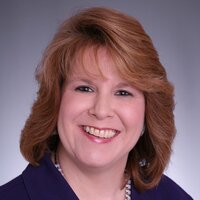 dy L. Bethel, (IEEE and ACM Senior Member) is an Associate Professor in the Computer Science and Engineering Department at Mississippi State University (MSU). She is the Director of the Social, Therapeutic, and Robotic Systems (STaRS) lab and a Research Fellow with the MSU Center for Advanced Vehicular Systems Human Performance Group and the Social Science Research Center. Dr. Bethel is the Chair of an interdisciplinary Robotic Systems Working group, a member of the Academy of Distinguished Teachers, a recipient of the 2014-2015 ASEE New Faculty Research Award for Teaching. She was awarded Fellowships as a NSF/CRA/CCC Computing Innovation Postdoctoral Fellow at Yale University, a National Science Foundation Graduate Research Fellow and the 2008 IEEE Robotics and Automation Society Graduate Fellowship. She graduated in August 2009 with her Ph.D. in Computer Science and Engineering from the University of South Florida. Her research interests include human-robot interaction, human-computer interaction, robotics, and artificial intelligence.
dy L. Bethel, (IEEE and ACM Senior Member) is an Associate Professor in the Computer Science and Engineering Department at Mississippi State University (MSU). She is the Director of the Social, Therapeutic, and Robotic Systems (STaRS) lab and a Research Fellow with the MSU Center for Advanced Vehicular Systems Human Performance Group and the Social Science Research Center. Dr. Bethel is the Chair of an interdisciplinary Robotic Systems Working group, a member of the Academy of Distinguished Teachers, a recipient of the 2014-2015 ASEE New Faculty Research Award for Teaching. She was awarded Fellowships as a NSF/CRA/CCC Computing Innovation Postdoctoral Fellow at Yale University, a National Science Foundation Graduate Research Fellow and the 2008 IEEE Robotics and Automation Society Graduate Fellowship. She graduated in August 2009 with her Ph.D. in Computer Science and Engineering from the University of South Florida. Her research interests include human-robot interaction, human-computer interaction, robotics, and artificial intelligence.
Anita Jones
Ani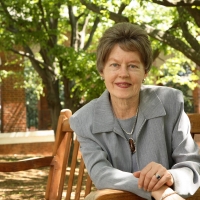 ta Jones is University Professor Emerita at the University of Virginia. She is a founder of the Computing Community Consortium(CCC). After the completion of the first Computing Innovation Fellows program, she led a CCC research effort to establish best practices for the support of computer science postdocs. Jones served as Director of Defense Research and Engineering, overseeing the DoD science and technology program, including its research laboratories and DARPA. She was Vice Chair of the National Science Board and a member of the governing council of theNational Academy of Engineering (NAE). Jones was awarded the IEEE Founders’ Medal, the Ada Lovelace Award by the Association of Women in Computing, the Arthur M. Bueche Award by the NAE, and the Philip Abelson Award by the AAAS. The U.S. Navy named a seamount in the North Pacific (51º 25’ N 159º 10’ W) for her.
ta Jones is University Professor Emerita at the University of Virginia. She is a founder of the Computing Community Consortium(CCC). After the completion of the first Computing Innovation Fellows program, she led a CCC research effort to establish best practices for the support of computer science postdocs. Jones served as Director of Defense Research and Engineering, overseeing the DoD science and technology program, including its research laboratories and DARPA. She was Vice Chair of the National Science Board and a member of the governing council of theNational Academy of Engineering (NAE). Jones was awarded the IEEE Founders’ Medal, the Ada Lovelace Award by the Association of Women in Computing, the Arthur M. Bueche Award by the NAE, and the Philip Abelson Award by the AAAS. The U.S. Navy named a seamount in the North Pacific (51º 25’ N 159º 10’ W) for her.
Stefan Savage
 Stefan Savage is a professor of Computer Science and Engineering at the University of California, San Diego. He received his Ph.D. in Computer Science and Engineering from the University of Washington and a B.S. in Applied History from Carnegie Mellon University. Savage is a full-time empiricist, whose research interests lie at the intersection of computer security, distributedsystems and networking. He currently serves as co-director of UCSD’s Center for Network Systems (CNS) and for the Center for Evidence based Security Research (CESR). Savage is a MacArthur Fellow, a Sloan Fellow, an ACM Fellow, and is a recipient of the ACM Prize in Computing and the ACM SIGOPS Weiser Award.
Stefan Savage is a professor of Computer Science and Engineering at the University of California, San Diego. He received his Ph.D. in Computer Science and Engineering from the University of Washington and a B.S. in Applied History from Carnegie Mellon University. Savage is a full-time empiricist, whose research interests lie at the intersection of computer security, distributedsystems and networking. He currently serves as co-director of UCSD’s Center for Network Systems (CNS) and for the Center for Evidence based Security Research (CESR). Savage is a MacArthur Fellow, a Sloan Fellow, an ACM Fellow, and is a recipient of the ACM Prize in Computing and the ACM SIGOPS Weiser Award.
Selection Committee
Emery Berger
Emery Berger is a Professor in the College of Information and Computer Sciences at the University of Massachusetts Amherst. His research interests span programming languages, systems, security, and human-computer interaction. Research from his group influenced the development of the Rust and Swift programming languages, analysis tools deployed in Google’s Android SDK, and memory managers deployed in both Mac OS X and Microsoft Windows. His honors include an NSF CAREER Award, three Most Influential Paper Awards (OOPSLA, PLDI, and ASPLOS) and five papers selected as CACM Research Highlights. Professor Berger is currently serving as the co-Program Chair for ASPLOS 2021 and in his second term as an elected member of the SIGPLAN Executive Committee. He also developed and maintains the CSrankings.org website. He received an MS and PhD in Computer Science from the University of Texas at Austin and was a Microsoft Research PhD Fellow. He is a Fellow of the ACM.
Azer Bestavros
Azer Bestavros is the Inaugural Associate Provost for Computing and Data Sciences at Boston University and the William Fairfield Warren Distinguished Professor in the Computer Science Department, which he joined in 1991 and chaired from 2000 to 2007. Prior to his appointment in 2019 to lead the Faculty of Computing & Data Sciences, he was the Founding Director of the Hariri Institute for Computing. His currently active projects are focused on design, development, and real-world deployment of Scalable Secure Multi-Party Computation in support of privacy-preserving analytics.
Azer held visiting appointments at Harvard University, Institut Eurecom in Sophia Antipolis (France), Deutsche Telekom in Berlin (Germany), Telefonica Research in Barcelona (Spain), KTH Royal Institute of Technology in Stockholm (Sweden), American University in Cairo (Egypt), and American University in Beirut (Lebanon). He obtained his B.Sc. (1984) and M.Sc. (1987) in Computer Science from Alexandria University, and his A.M. (1988) and PhD (1992) in Computer Science from Harvard University.
Marie desJardins
Dr. Marie desJardins is the Dean of the College of Organizational, Computational, and Information Sciences. Prior to joining Simmons, Dr. desJardins served as Professor and Associate Dean for Academic Affairs at the University of Maryland, Baltimore County’s College of Engineering and Information Technology. Her research is in artificial intelligence, focusing on the areas of machine learning, multi-agent systems, planning, interactive AI techniques, information management, reasoning with uncertainty, and decision theory. Dr. desJardins is a AAAI Fellow and recipient of the EAAI/AAAI Outstanding Educator Award, UC Berkeley Distinguished Alumni Award in Computer Science, A. Richard Newton Educator ABIE Award, NCWIT and CRA Undergraduate Research Mentoring Awards, and UMBC Distinguished Teaching Professor.
Jessica Hodgins
Jessica Hodgins is the Allen Newell University Professor in the Robotics Institute and Computer Science Department at Carnegie Mellon University. Since 2019, she has been part-time at Facebook building a new research lab in Pittsburgh for Facebook AI Research. From 2008-2016, she founded and ran research labs for Disney, rising to VP of Research. Prior to moving to Carnegie Mellon in 2000, she was an Associate Professor and Assistant Dean in the College of Computing at Georgia Institute of Technology. She received her Ph.D. in Computer Science from Carnegie Mellon University. Her research focuses on computer graphics, animation, and robotics with an emphasis on generating and analyzing human motion. She has received a NSF Young Investigator Award, a Packard Fellowship, and a Sloan Fellowship. She was an elected director at large on the ACM SIGGRAPH Executive Committee from 2012-2017 and served as ACM SIGGRAPH President from 2017-2020. In 2010, she was awarded the ACM SIGGRAPH Computer Graphics Achievement Award and in 2017 she was awarded the Steven Anson Coons Award for Outstanding Creative Contributions to Computer Graphics.
Ben Kuipers
Benjamin Kuipers is a Professor of Computer Science and Engineering at the University of Michigan. He was previously an endowed Professor in Computer Sciences at the University of Texas at Austin, where he served as Department Chair. He received his B.A. from Swarthmore College, his Ph.D. from MIT, and he is a Fellow of AAAI, IEEE, and AAAS. His research in artificial intelligence and robotics focuses on the representation, learning, and use of foundational domains of knowledge, including knowledge of space, dynamical change, objects, and actions. He is currently investigating ethics as a foundational domain of knowledge for robots and other AIs that may act as members of human society.
Daniel Lopresti
Dan Lopresti is a Professor of Computer Science and Engineering at Lehigh University. He received his bachelor’s degree from Dartmouth in 1982 and his Ph.D. in computer science from Princeton in 1987. After completing his doctorate, he joined the Department of Computer Science at Brown and taught courses ranging from VLSI design to computational aspects of molecular biology and conducted research in parallel computing and VLSI CAD. He went on to help found the Matsushita Information Technology Laboratory in Princeton, and later also served on the research staff at Bell Labs, Murray Hill where his work turned to document analysis, handwriting recognition, and biometric security. In 2003, Lopresti joined Lehigh where his research examines fundamental algorithmic and systems-related questions in pattern recognition, document analysis, bioinformatics, and computer security. He has also held various service roles at Lehigh, including Chair of the CSE Department, Interim Dean of the P. C. Rossin College of Engineering and Applied Science, and Director of the Data X strategic initiative. Lopresti is the Vice Chair of the CCC Council.
Ray Mooney
Ray Mooney is a Professor of Computer Science at the University of Texas Austin and Director of the UT Artificial Intelligence Laboratory. Mooney leads the Machine Learning Research Group at the laboratory currently focusing on natural language processing / computational linguistics. Additional Areas of interest are Artificial Intelligence, Bioinformatics and Computational Biology, and Data Mining and Machine Learning. Mooney received his PhD in Computer Science in 1987at the the University of Illinois in Champaign-Urbana where he also earned a M.S. in Computer Science and a B.S. in Computer Engineering. He is a Fellow of ACM, AAAI, and ACL.
Sean Munson
Sean A. Munson is an Associate Professor in the Department of Human Centered Design & Engineering (HCDE) and adjunct faculty in the Paul G. Allen School of Computer Science & Engineering. Working primarily on challenges of health, wellbeing, and exposure to diverse information, Munson designs and evaluates techniques for helping people make sense of data about themselves and the world around them. Munson directs the HCDE PhD program, chairs the HCI+D Interdisciplinary Faculty Group, is a member of the DUB group, and is methods co-director for the UW ALACRITY Center. He received a National Science Foundation Early Career Award, a UW College of Engineering Teaching Award (2015) and a College of Engineering Junior Faculty Award (2017). Munson received his PhD in 2012 at the University of Michigan’s School of Information, was an Intel PhD Fellow and completed his BS in Engineering with a concentration in Systems Design at Olin College in 2006.
Jelani Nelson
Jelani Nelson is a Professor of EECS at UC Berkeley as a member of the Theory Group. Prior to UC Berkeley he held positions at Harvard as an Associate Professor of Computer Science, John L. Loeb Associate Professor of Engineering and Applied Sciences, and Assistant Professor of Computer Science. He has been a member of the Institute for Advanced Study and held postdoc positions at Princeton University and the Mathematical Sciences Research Institute. He received his Ph.D. in 2011 from the Massachusetts Institute of Technology where he also received an M.Eng. degree in Computer Science, and S.B. degrees in Mathematics and in Computer Science.
Katie Siek
Katie Siek is a professor and chair in Informatics at Indiana University. Her primary research interests are in human computer interaction, health informatics, and ubiquitous computing. More specifically, she is interested in how sociotechnical interventions affect personal health and well being. Her research is supported by the National Institutes of Health, the Robert Wood Johnson Foundation, and the National Science Foundation including a five-year NSF CAREER award. She has been awarded an NCWIT Undergraduate Research Mentoring Award (2019), a CRA-W Borg Early Career Award (2012), and Scottish Informatics and Computer Science Alliance Distinguished Visiting Fellowships (2010 & 2015). She earned her PhD and MS in computer science at Indiana University as a National Physical Science Consortium Fellow and a BS in computer science at Eckerd College as a Ford Apprentice Scholar.
